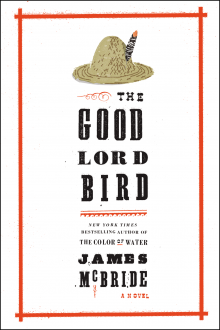
FIRST BOOK FOR 2014
Date Started: January 2, 2014 | Date Finished: January 7, 2014
First lines: I was born a colored man and don't you forget it. But I lived as a colored woman for seventeen years.
Winner of the 2013 National Book Award for Fiction | A Washington Post, Publishers Weekly, Oprah Magazine Top 10 Book of the Year
----------
Henry Shackleford is a young slave living in Kansas who was ‘rescued’ by John Brown, the famed abolitionist. Because of Henry’s features and clothing, he was mistaken for a girl and was later known as ‘Henrietta’. This eventually became 'Onion' after he ate an onion considered by John Brown as a lucky charm. Onion reluctantly traveled with the Old Man (as Onion calls him) and his army, accompanying them in their incursions. To survive he needed to pretend he was a girl. He ends up liking the advantages of being one, such as not being assigned to do heavy tasks and getting pampered by the Old Man and certain people he meets along the way.
The story follows John Brown in the last years of his life through the eyes of Onion. As the story moves along, we find out that the Old Man’s focus was eliminating slavery through insurrection and violent means. John Brown was much feared by people of that time. His character was developed as a strong and unstoppable presence who inspires hate, adoration and fear in people. Some consider him a madman, a fanatic, a zealot or a martyr, but Onion later sees the Old Man in a different light. The Old Man was kind and accepting like a father, but feared and misunderstood like a wild animal. John Brown was a man of unbridled ambition and enthusiasm, who has a liking to praying for significant amounts of time, and referring to bible verses when lecturing his men and justifying his actions and cause. Through the Old Man’s leadership, sheer determination and perhaps even luck, he managed to lead his small army to some successful missions even in unfavorable conditions. However, his plans were often doubted even by his own sons and allies. In their eyes, he is an impractical and idealistic leader, risking all of his men’s lives through unrealistic decisions and plans. Despite this, a reader may find him/herself drawn to John Brown because of his ideals, way of doings things, and most of all his kindness. You sympathize with him because you know that people betrayed him and he was very dedicated to the cause. John Brown's character makes you wonder to what extent can we dedicate ourselves to a purpose. Are we willing to sacrifice everything for what we are fighting for? How much is enough? Onion often intuited that John Brown’s reckless actions, gullibility and susceptibility to bad luck (even in Onion’s presence) was a portent of the events to come.
The book allowed us to enter Onion’s mind and vision not merely to see the world as he sees it but to also identify with him. In Onion, we see a young man who is constantly debating with himself. There are times when he wants to run away from the John Brown’s army and his cause, but there are also times when his conscience confronts him, making him do the right thing, at least according to him. We also see a young man who has the capacity to love truly and care for another person. We are witness to his heart being broken and privy to the thoughts that inspire his decisions. There were times when Onion had to seek ways out of a dilemma, which often resulted in humorous moments that made me laugh out loud. With its brilliant, somewhat sarcastic dialogue, one can't help but find the book funny at times. Towards the end of the book, and inspired by a chance meeting with the Harriet Tubman, Onion has an inner dialogue where we became a witness to his thoughts about identity. Through these realizations, Onion confronts the enormity of the war he was helping to fight while also questioning what it means to be true to one’s self. I especially liked that part when Onion ran back to Harpers Ferry to join John Brown because for him, it was the right thing to do, even if it means risking his life.
At a very deep level, you can sense hope and faith amidst the struggles encountered by the characters. This is not merely a tale of John Brown and his fight against slavery and the struggles he faced. Most importantly though, at least for me, is that it's a story about the quest for identity where Onion tries to piece together the importance of 'being a man' and being true to yourself. It's also about sacrificing one's self for the greater good. At the end of the story, when John Brown was executed, Onion tells us about people singing John Brown's favorite song "Blow Ye Trumpet" inside a church while a Good Lord Bird circled up above it. The Good Lord Bird as John Brown described it before his execution is a bird that flies alone looking for the right tree to gnaw so as to give life to other trees. One would get the idea then that John Brown's fate wasn't necessarily a failure but something that would give life and motivation to future events.
While reading the book, I felt that I was somewhere else. James McBride’s writing has the ability to transport you into a new world and a different time, while engaging you with the story through the characters and events that transpire. Onion is a unique and original character. Surely he will linger in the minds of many a readers after they are done reading. The book makes you reflect on big issues about life and survival while providing insights about slavery, gender, racism and faith. This book propelled me to a world of adventure and suspense, while teaching me a thing or two about American history, but also of the importance of being true to yourself. The Good Lord Bird tells a great story and tells it brilliantly. What a great read!


 Log in with Facebook
Log in with Facebook 









